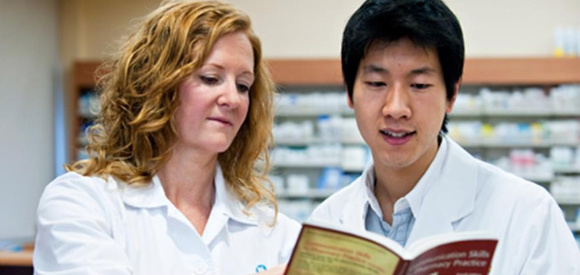What does a pharmacist do? Most people would answer that question with, “Fill prescriptions.” If you ask UBC pharmacy students Gloria Su, Lauren Bissonnette, Allison Gamble and Charles Au, they’ll tell you that pharmacists change people’s lives.
The students are active members of the Community Health Initiative by University Students (CHIUS), a volunteer program providing health care in Vancouver’s Downtown Eastside (DTES) community characterized by high rates of poverty, crime, and drug addiction.
“It’s quite a humble learning experience,” says Lauren. “You don’t automatically get the respect of a healthcare professional that you would at clinics in other neighbourhoods. With patients in the DTES, you have to earn it by gaining their trust. ” The students lead a Pharmacy Brown Bag that provides a warm and comfortable environment for patients to talk about their medications, medical conditions, and any health related questions they may have. Students get to know patients on a more personal level over coffee, tea and snacks.
DTES patient cases are much different than those studied in the classroom, giving students the opportunity to practice their problem solving skills in a real world setting. “I remember one patient, an HIV positive woman,” says Gloria. “She came to one of our events with concerns about anti-retroviral medications.” The side effects were so distressing that she was at the point of ignoring her doctor’s treatment plan. But after being counseled by Gloria and Lauren, she pushed through and returned to the clinic six months later to thank them for their help. “Her perspective totally changed and she’s now an advocate of anti-retrovirals with other HIV positive patients at the clinic,” says Allison.
With scholarship and bursary support, Pharmacy students are able to volunteer with programs such as CHIUS. “My scholarships helped free up my time to volunteer in my community,” says Charles. “Many of my peers work part-time to pay for their expenses and many more go into substantial debt.”
The pharmacist stereotype is one of being behind the counter. Involvement in programs like CHIUS, however, gets the next generation of pharmacists away from the counter and into the community where the real impact of pharmacy is felt.
New Pharmacists Clinic will expand our community involvement
The pharmacy profession is not practiced in isolation. In determining optimal healthcare outcomes, our pharmacists work with patients and healthcare providers in a collaborative dialogue where information is shared openly. The work of a pharmacist is enriched by what is learned from patients and through donor-supported cooperative partnerships with the community. In the new Faculty of Pharmaceutical Sciences building, we plan to expand on our community involvement through our Pharmacists Clinic. This will be a place where patient-centred care is the norm and people will be educated on their benefits and risks of drug therapy along with the discussion of potential options that fit their preferences and lifestyle.
“It’s a truly innovative concept,” says Tessa Nicholl, Instructor and one of several key Faculty members involved with developing the clinic. “The public will be able to access direct patient care and medication counseling through community seminars and personal consultations. Simultaneously, pharmacy students, residents and practicing pharmacists will benefit from the clinic as a training centre.”
The idea for the Pharmacists Clinic was conceived out of an interest in education, innovation, and patient-centred care independent of pharmaceutical sales. It takes an inter-professional collaborative approach and is based on making shared and informed decisions on medication therapy management.
“The Pharmacists Clinic will be a referral centre for healthcare professionals,” Tessa explains. “We will provide drug therapy assessments, educate patients on the risks of drug therapy and identify drug therapy problems in an experiential learning environment.” Patients will also be invited to participate in clinical and practice-based health outcome research.
The vision of the Pharmacists Clinic is to optimize drug therapy for patients. By understanding the advantages and disadvantages of medications and individualized pharmacological therapies, patients will derive the best possible health outcome for themselves. The Pharmacists Clinic will serve as an adaptable model of community-based pharmacy practice, which hopefully will be recreated in other community settings.
“The learning resources and healthcare benefits this clinic represents could be tremendous,” says Tessa. “Donations made in support of the new building could help make the clinic accessible to everyone for many years to come.”
For more information, please contact Tessa Nicholl, Instructor, at tessa.nicholl@ubc.ca or 604-827-3368.

